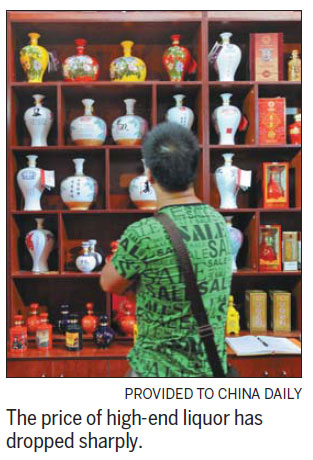Anti-graft drive dampens spirits

Sales of Liquor fall sharply as government cracks spending whip
The price of Chinese high-end liquor has dropped sharply this year, and in some cases has halved. One reason is the government's anti-corruption drive and its reining in of lavish spending.
Baijiu, particularly the most expensive kinds, has traditionally been sought after for official banquets and for gifts but that has changed this year.
When the country's new leaders took office in March, Premier Li Keqiang vowed to reduce government departments' spending on receptions, vehicles and overseas trips.
Liu Yuan, secretary-general of the China National Association for Liquor and Spirits Circulation, says that before the Spring Festival in February, liquor retailers were already heavily discounting stock.
The best-known Chinese liquor brand is Moutai, a drink often cited in corruption cases as something proffered by those seeking to influence the powerful.
As the government has clamped restrictions on official spending on ostentatious dining and entertainment, the price of Moutai has fallen for the first time in nine years.
From 2010 until last year the price rose, and last year it was retailing for more than 2,000 yuan ($325; 246 euros) a bottle. But last month one line of Moutai was retailing for about 900 yuan, just 100 yuan more than the factory price. Over the past two months, high-end Chinese spirits have been selling at a discount because of the quiet market, Money Week, a Chinese business newspaper, reported.
"Most people who buy Moutai buy it as a present," says a liquor shop owner surnamed Chen in the Fengtai district of Beijing who has been selling Moutai and other Chinese liquors for five years.
"People who drink Moutai usually don't buy it themselves. You wouldn't see an unemployed man drinking it at home with a dish of nuts. It has become a status symbol, something that doesn't really fit into most people's lives."
Popular spirits in his shop that "normal families" buy cost about 60 yuan a bottle.
Chinese high-end spirits apart from Moutai, such as Wuliangye, Luzhou and Laojiao, are also on sale, at a discount of 10 percent, about 100 yuan.
"When Moutai was selling for more than 2,000 yuan last year I sometimes sold out, but now, even after steep price falls, sales are slow," Chen says.
Some experts have suggested that Chinese liquor makers change their marketing strategy.
"Clearly there has been a change in demand, and the industry will need to change," Ji Zhengkun, president of the China Association of Standardization, said last month.
"Chinese liquor businesses have relied too much on government consumption and drinking at public events, and now they need to cater more to mainstream consumers."
zhaoyanrong@chinadaily.com.cn


















